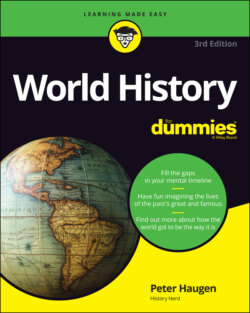Читать книгу World History For Dummies - Peter Haugen - Страница 11
Firing Up the WABAC Machine
ОглавлениеIf you care about classic TV cartoons, you’ve heard of the WABAC Machine. Pronounced “way back,” the machine was a fictional time-traveling device built and operated by a genius dog named Mr. Peabody. In every episode of the 1960s animated series Rocky and His Friends, the professorial pooch and his pet boy, Sherman, transported themselves to a historical setting — say, ancient Rome, revolutionary America, or medieval England — where they interacted with famous people and solved whatever ridiculously absurd dilemma was troubling cartoon Julius Caesar, George Washington, or King Arthur. Thus, Mr. Peabody and Sherman allowed the events we think of as history to take their proper course.
These episodes spoofed a classic science-fiction premise. Storytellers often use time travel as a plot device. American novelist Mark Twain did it in 1889 with A Connecticut Yankee in King Arthur’s Court. England’s H.G. Wells followed suit in 1895 with The Time Machine, although he sent his protagonist (identified only as “the Time Traveller”) into the future. Other examples include British TV’s numerous incarnations of Doctor Who to hundreds of novels, graphic novels, plays, films, and videogames.
Often, these stories involve someone going back in time to change something in the present or to prevent the present from being changed in some fashion that will cause a future catastrophe. One tiny interference in the “time continuum,” as it’s often called, can lead to a monumentally altered chain of events.
Nobody can do that, of course.
You can, however, understand more about the present if you time travel in your head — that is, think about the ways that yesterday’s events shaped today. You can ponder how what happened a decade ago shapes this year and how a single change somewhere in the past could have made today different. Historians scoff at the “what if” game, but it’s a tool for getting your head into history.
What if incumbent Donald Trump had won the 2020 U.S. presidential election instead of challenger Joe Biden? Would an angry mob have attacked the U.S. Capitol the following January? How different would American politics have been? How about if voters in the United Kingdom had not chosen, in a 2016 referendum, to withdraw that nation from the European Union? Would that nation’s banks or fishing industry be better off or worse today? What about its people?
For that matter, what if Japan had not attacked the U.S. fleet at Pearl Harbor in 1941? Or what if the terrorists who crashed airliners into the World Trade Center and the Pentagon on September 11, 2001, had been stopped before they could board the planes? Think about the lives that would have been saved and the grief that would have been averted. Imagine the years since. What would have been different?
In the case of the World Trade Center, U.S. troops wouldn’t have been sent to Afghanistan, for one thing. That invasion turned into a two-decades-long conflict, the United States’ longest war. And if the Trade Center had not fallen, would there have been that other U.S. war in the Middle East — the one in Iraq? We can’t know for sure, but we know that many lives changed because of that tragic 2001 attack.
